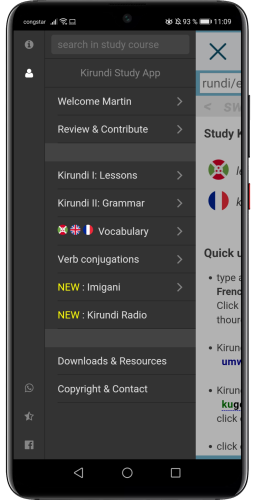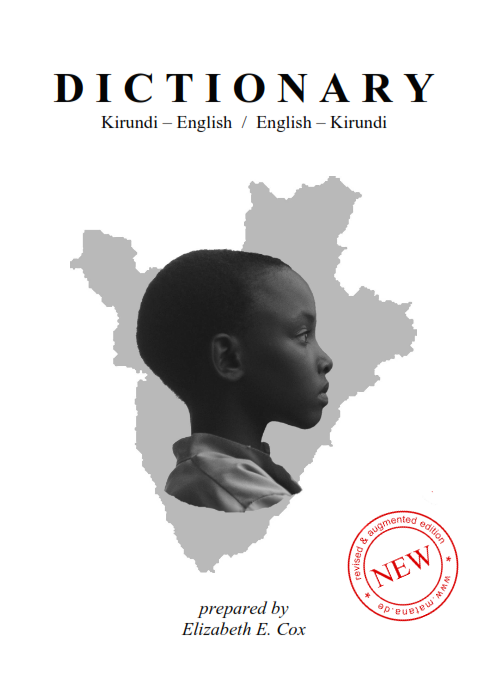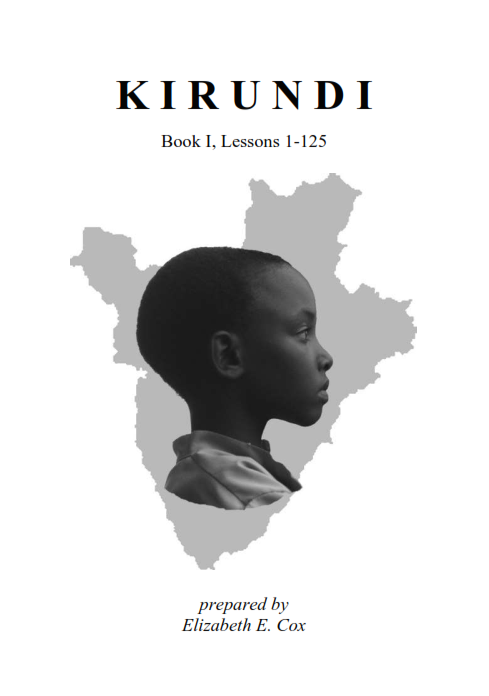umusore (aba-) 1 class 1
singular: umu-
plural: aba- ▶ 1. adolescent, 2. bachelor, unmarried young man, (pl. also imisore, then with negative connotation: youth mob)
singular: umu-
plural: aba- ▶ 1. adolescent, 2. bachelor, unmarried young man, (pl. also imisore, then with negative connotation: youth mob)
song ▶ indirīmbo, ururirimbo
(~ for two alternating choirs) ikimpwiri
(milling ~) indengo
(war songs) amazina y'ubuhizi, amazina y'urugamba
(sing or play plaintive) gucurira intimba
see also singing
(~ for two alternating choirs) ikimpwiri
(milling ~) indengo
(war songs) amazina y'ubuhizi, amazina y'urugamba
(sing or play plaintive) gucurira intimba
see also singing
En-En dictionary
leaves ▶ (young bean ~, when only the first two are there) ingāmba
(stripped from tree) udukōkōrwa
(used for perfume) imbazi
(see also 'leaf')
(to have abundant) gusagaba
(to put forth new) kurēmba
(to strip from tree or stick) gukōkōra
(stripped from tree) udukōkōrwa
(used for perfume) imbazi
(see also 'leaf')
(to have abundant) gusagaba
(to put forth new) kurēmba
(to strip from tree or stick) gukōkōra
En-En dictionary
ijāmbo (ama-) 5 class 5
singular: i-,iri-
plural: ama- ▶ 1. word, 2. term, (pl. also amagambo), 3. good discursive condition
singular: i-,iri-
plural: ama- ▶ 1. word, 2. term, (pl. also amagambo), 3. good discursive condition
iradiyo (i-) 3 class 3
singular: i-,in-
plural: i-,in- ▶ radio (plural also amaradiyo)
singular: i-,in-
plural: i-,in- ▶ radio (plural also amaradiyo)
mushiki (ba-) 1 class 1
singular: umu-
plural: aba- ▶ sister (of boy)
mushiki wiwe his sister
mushiki wanyu your sister (spoken to boys)
(see also mushikanje, mushikabo)
singular: umu-
plural: aba- ▶ sister (of boy)
mushiki wiwe his sister
mushiki wanyu your sister (spoken to boys)
(see also mushikanje, mushikabo)
ill ▶ (to be) kurwāra, kuyōka
(often) kurwāragurika, kubūnga
(to become ~ one after another) guhindikirana
(to lie around ~ long time) kuvūnda
(see also under 'sick')
(often) kurwāragurika, kubūnga
(to become ~ one after another) guhindikirana
(to lie around ~ long time) kuvūnda
(see also under 'sick')
En-En dictionary
-rtya adj ▶ like this (see also -rtyo, like that)
swell ▶ kuvyīmba, kubōmboka, gutumba
(as beans) gukakama
(as beans, bread) gututūmba
(bread) gukuka
(esp. dead animal, also beans) gutumbagana
(in welts) kuramura
(as beans) gukakama
(as beans, bread) gututūmba
(bread) gukuka
(esp. dead animal, also beans) gutumbagana
(in welts) kuramura
En-En dictionary
ifi (ama-) 3 5 sg. class 3: i-,in-
pl. class 5: ama- ▶ fish (plural sometimes also i-)
pl. class 5: ama- ▶ fish (plural sometimes also i-)
gutāmba (-tāmvye) v ▶ to dance (see also kwītāmba)
kugānza (-gānje) v ▶ to rule over, govern (past also njije)
ganza, sabwe! long live the king! (greeting to superior)
ganza, sabwe! long live the king! (greeting to superior)
gurtya adj ▶ like this (see also gurtyo, like that)
gusagāra (-sagāye) v ▶ 1. to multiply (vi), be many (esp. of cows, also of trees), 2. to get in nose and cause to sneeze (as pepper)
bwakēye phr ▶ Good morning (from guca, greeting used almost any time of day if first meeting, also bgakēye)
gutumbagana (-tumbaganye) v ▶ to be swollen, to swell (esp. of dead animals, also of beans, etc.)
kuzūnguruka (-zūngurutse) v ▶ to go around, to cycle (the stem 'zungu' is also the origin of umuzungu, which does not mean 'white person' but rather 'someone going around', describing the first European explorers)
igitōnyānga (ibi-) 4 class 4
singular: iki-,ic-
plural: ibi-,ivy- ▶ drop of liquid (pl. also amatōnyānga)
singular: iki-,ic-
plural: ibi-,ivy- ▶ drop of liquid (pl. also amatōnyānga)
ibitōke vyokeje phr ▶ roasted bananas (see also -okeje)
teeth ▶ amēnyo (see also tooth)
(grinding of) insya z'amēnyo
(very close together) impatane
(to brush the) kwīnyugunura, kwīyugunyura
(to get the first) kwēra
(to grit) gukomānya, kuzyēgenya
(to grit one's ~ to avoid showing pain) gushinyanga, gushinyiriza
(to notch) guhongora
(to pull) guhongora
(grinding of) insya z'amēnyo
(very close together) impatane
(to brush the) kwīnyugunura, kwīyugunyura
(to get the first) kwēra
(to grit) gukomānya, kuzyēgenya
(to grit one's ~ to avoid showing pain) gushinyanga, gushinyiriza
(to notch) guhongora
(to pull) guhongora
En-En dictionary
inzu (in-) 3 class 3
singular: i-,in-
plural: i-,in- ▶ house, building (plural sometimes also amazu)
singular: i-,in-
plural: i-,in- ▶ house, building (plural sometimes also amazu)
agakomokomo (udu-) 7 class 7
singular: aka-,aga-
plural: utu-,udu- ▶ base of brain, occiput (also inkomokomo)
singular: aka-,aga-
plural: utu-,udu- ▶ base of brain, occiput (also inkomokomo)
firigo (ama-) 5 class 5
singular: i-,iri-
plural: ama- ▶ 1. refrigerator, fridge, 2. freezer (also frigo)
singular: i-,iri-
plural: ama- ▶ 1. refrigerator, fridge, 2. freezer (also frigo)
frigo (ama-) 5 class 5
singular: i-,iri-
plural: ama- ▶ 1. refrigerator, fridge, 2. freezer (also firigo)
singular: i-,iri-
plural: ama- ▶ 1. refrigerator, fridge, 2. freezer (also firigo)
gurtyo adj ▶ like that (also durtyo, murtyo, bartyo, etc.)
ifarāshi (ama-) 5 class 5
singular: i-,iri-
plural: ama- ▶ (Sw.) horse (also ifarasi)
singular: i-,iri-
plural: ama- ▶ (Sw.) horse (also ifarasi)
igihefu (ibi-) 4 class 4
singular: iki-,ic-
plural: ibi-,ivy- ▶ mushroom (also igihefo)
singular: iki-,ic-
plural: ibi-,ivy- ▶ mushroom (also igihefo)
igihepfo (ibi-) 4 class 4
singular: iki-,ic-
plural: ibi-,ivy- ▶ mushroom (also igihefo)
singular: iki-,ic-
plural: ibi-,ivy- ▶ mushroom (also igihefo)
ijānja (ama-) 5 class 5
singular: i-,iri-
plural: ama- ▶ paw, foot of animal (also used of person carrying something in one hand when it should be two: urafashe mw ijanja)
singular: i-,iri-
plural: ama- ▶ paw, foot of animal (also used of person carrying something in one hand when it should be two: urafashe mw ijanja)
ipantaro (ama-) 5 class 5
singular: i-,iri-
plural: ama- ▶ trouser (also ipantalo, Fr.)
singular: i-,iri-
plural: ama- ▶ trouser (also ipantalo, Fr.)
isekuru (ama-) 5 class 5
singular: i-,iri-
plural: ama- ▶ mortar for grinding (also isekuro)
singular: i-,iri-
plural: ama- ▶ mortar for grinding (also isekuro)
kāndi conj ▶ and, and then, also, furthermore (used for connecting clauses, not words in a series)
kujabuka (-jabutse) v ▶ 1. to cross river, valley, 2. (also used of woman who has come to the menopause), 3. to finish menstrual period
kuruta (-rushe) v ▶ to surpass, to be better (also used to make comparative)
kuvōvōta (-vōvōse) v ▶ 1. to talk nonsense when drunk, to say a lot of slanderous talk, 2. to speak incoherently, 3. to rain early in morning or for a long time, 4. to give oneself to the service of Kiranga (also kubāndwa), 5. to divine
leta 3 class 3
singular: i-,in-
plural: i-,in- ▶ the state, government (also reta), (from Fr. l'état)
singular: i-,in-
plural: i-,in- ▶ the state, government (also reta), (from Fr. l'état)
marariya 3 class 3
singular: i-,in-
plural: i-,in- ▶ malaria (also malariya)
singular: i-,in-
plural: i-,in- ▶ malaria (also malariya)
politiki 3 class 3
singular: i-,in-
plural: i-,in- ▶ politics (also poritiki)
singular: i-,in-
plural: i-,in- ▶ politics (also poritiki)
sēbabiri (ba-) 1 class 1
singular: umu-
plural: aba- ▶ father of twins (also used for the mother)
singular: umu-
plural: aba- ▶ father of twins (also used for the mother)
umukoloni (aba-) 1 class 1
singular: umu-
plural: aba- ▶ colonialist, colonist, colonizer (also umukoroni)
singular: umu-
plural: aba- ▶ colonialist, colonist, colonizer (also umukoroni)
umupfuko (imi-) 2 class 2
singular: umu-
plural: imi- ▶ 1. pocket, 2. sack, 3. bag, 4. purse (also umufuko)
singular: umu-
plural: imi- ▶ 1. pocket, 2. sack, 3. bag, 4. purse (also umufuko)
urwārwa (inz-) 6 class 6
singular: uru- ▶ banana beer (also urwāgwa, urwāwa, the plural is only used when the beer is criticized)
singular: uru- ▶ banana beer (also urwāgwa, urwāwa, the plural is only used when the beer is criticized)
tomorrow ▶ ejo (lit. 'the other day', therefore also: yesterday)
(day after ~) hīrya y'ējo
(day after ~) hīrya y'ējo
En-En dictionary
yesterday ▶ ejo (lit. 'the other day', therefore also: tomorrow)
(day before ~) hīrya y'ējo, juzi
(day before ~) hīrya y'ējo, juzi
En-En dictionary
also found in: Kirundi I (Study lessons)
lesson 11 ▶ Class 3 in–, in– (continued)
lesson 15 ▶ Special Uses of Class 4 iki–, ibi–
lesson 18 ▶ Class 5 i–, ama–
lesson 24 ▶ Class 6 uru–, in– (continued)
lesson 27 ▶ Class 8 ubu–, ama–
lesson 29 ▶ Future Tense
lesson 30 ▶ Review 21 - 29
lesson 31 ▶ Negative of Future
lesson 39 ▶ –ngahe (How many?)
lesson 43 ▶ –ndi (Other)
lesson 45 ▶ Verb –zi (To know)
lesson 51 ▶ Ordinary Past Tense I
lesson 61 ▶ Ordinal Numerals
lesson 65 ▶ –o with the Infinitive
lesson 66 ▶ Imperatives with the Subjunctive
lesson 69 ▶ Possessive Particle –a Changed to –o
lesson 74 ▶ Brother and Sister
lesson 78 ▶ Causative Verbs I
lesson 79 ▶ Causative Verbs II
lesson 86 ▶ Demonstrative Adjectives I
lesson 88 ▶ Demonstrative Adjectives III
lesson 89 ▶ Not Yet Tense
lesson 99 ▶ Uses of Prepositional Form
lesson 102 ▶ Miscellaneous Words
lesson 104 ▶ Uses of Nta
lesson 105 ▶ Further Notes on Nta
lesson 107 ▶ Associative Verbs
lesson 108 ▶ Adverb –te? Comparisons
lesson 116 ▶ Ki and Umuki
lesson 118 ▶ Some Adverbs; The –raca– Tense
lesson 119 ▶ More Adverbs
lesson 120 ▶ Miscellaneous Expressions
lesson 121 ▶ More Miscellaneous Expressions
also found in: Kirundi II (Grammar)
chapter 2 ▶ Compound Future Tenses, Compound Conditional
chapter 3 ▶ Conditional Sentences – “if”
chapter 4 ▶ –ba as an Auxiliary Verb
chapter 5 ▶ Continuous (or Actual) Present
chapter 6 ▶ Habitual Past
chapter 7 ▶ “never-yet” Tenses
chapter 9 ▶ “immediately”
chapter 10 ▶ –o– Conditional in Present, Past and Future
chapter 16 ▶ Prefixless Past Tense
chapter 17 ▶ –kazo– Infix
chapter 18 ▶ Optative Mood
chapter 20 ▶ –gira for Negative Imperative, and meaning “to be”
chapter 26 ▶ Special Verb Endings
chapter 44 ▶ –heza for “then”
chapter 58 ▶ Possessive Adjectives made into Pronouns
chapter 70 ▶ Vocative
chapter 73 ▶ How to say “without”
chapter 79 ▶ Various Expressions










 printable PDF files.
printable PDF files.

 This unique dictionary by Betty Cox is known for the deep cultural insight it provides to many Kirundi terms. It has been thouroughly revised, adapted to present-day Kirundi orthography rules and many new words and meanings have been added.
This unique dictionary by Betty Cox is known for the deep cultural insight it provides to many Kirundi terms. It has been thouroughly revised, adapted to present-day Kirundi orthography rules and many new words and meanings have been added. The Kirundi self study course guides you through 125 lessons and makes you learn both the necessary vocabulary and basic grammar.
The Kirundi self study course guides you through 125 lessons and makes you learn both the necessary vocabulary and basic grammar. English pronunciation by
English pronunciation by


